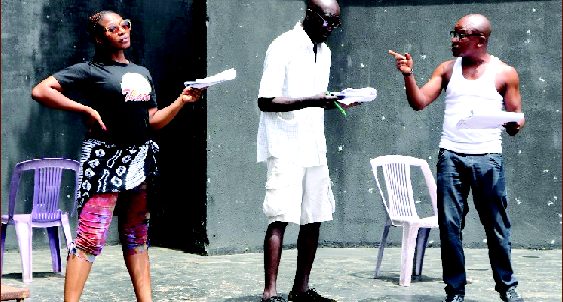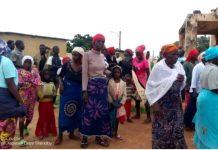THE venue was Agip Recital Hall, MUSON Onikan and as expected as early as 2.00 pm theatre lovers were already seated at the purveyor of the hall waiting for the 3.00 time opening of the gates for the play Our Wives Revolt, a drama piece by Prof J P Clark that took the audience back to the good old days when Men were the lord in their homes and the women were just there.
*A scene from the play
The play which had a command performance on 29th, and later two sessions on 31st was performed as part of the activities marking the month-long celebration of Women and was put together by African Radio Drama Association, ARDA.
As one entered the hall, the setting spoke volumes of its originality as carved chairs, mud houses, moderated lights and a make shift acting area constituted the homely theatre ambience for the play. The local voice of the women of the city set the mood for the play which begins with the appearance of Okoro, Koko’s husband. Okoro, equipped with the gong, announces the enforcement of a new law banishing goats in the oil-rich Erhuwaren village.
That law sparks a feud in the community between the men and the women as the latter are the owners of these forbidden domestic animals. The law was considered as repressive by the women. Already, the sharing formula for the oil wealth has been in three parts namely the elders, men of particular age-group and women. The women reason that the elders are the men and the implication is that the menfolk hold the two-thirds of the oil revenue. Hence, the women plan to make men their “domestic animals”. In their bid to be heard, they deserted their homes and their children, leaving their husbands to do the domestic chores such as cooking, sweeping and other menial tasks that the men would otherwise treat as masculine abomination. The women travelledall the way to Eyara while expecting to be quickly recalled by their lonely husbands. But their husbands who felt a bit of what women do at homes are prepared for the worse. At Eyara, the women are accommodated and cared for by Ighodayen, a notorious prostitute where they contacted a disease.
There are only three major characters in this drama, making the story easy to follow from the outset. It clearly dramatises the injustice the women suffer at the hands of their men. Unlike in traditional times, when the fairer sex had to swallow whatever males gave them, the wives (and even the mothers of the men) of the Erhuwaren don’t take ‘no’ for an answer. They know how to fight for their rights. Okoro represents the deepest kinds of misogyny: when men don’t help their women to do the chores, don’t give their wives enough money for food and yet complain the soup isn’t tasty. Or those who beat up their partners in a drunken state and cap it all by accusing them of crimes they haven’t committed (Chinelo Oputa).
Koko, the wife of Okoro, conveys female dynamism: the living version of the saying, ‘as you make your bed, so you will lie on it’. If you want peace, they’ll give you peace. But if you want trouble, they’ll neither spare you nor themselves. Idama, the friend and peer of Okoro, is the human conscience struggling to create a balance between a man’s longing to satisfy himself and the need to do so without offending anyone.
Speaking after the play, ARDA executive director and the executive producer of the play, Alison Data Phido who stated that the play demonstrated the fact that an idea by the women can change the society, however said that the choice of the play was first to honour men and women who has been fighting inequality in the society and to honour an icon of literature, J P Clark now that he is alive for his contributions to the literary world.







